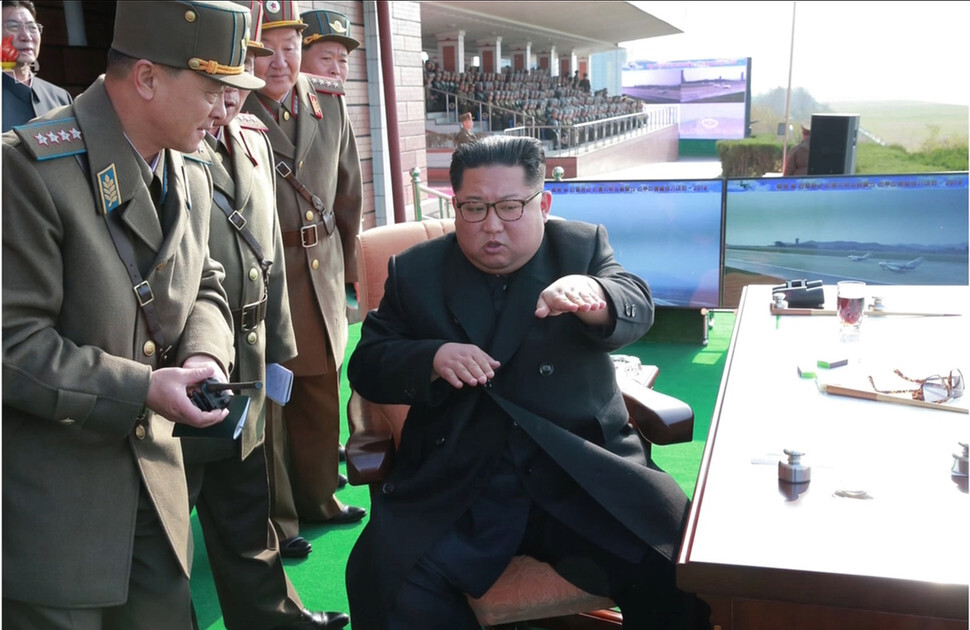hankyoreh
Links to other country sites 다른 나라 사이트 링크
N. Korea says it won’t return to dialogue until US withdraws “hostile policy”

A spokesperson for the North Korean Foreign Ministry said on Nov. 17 that the nuclear issue “would never be put under discussion before the withdrawal of the US hostile policy would be put on the agenda for the sake of improved relations with the DPRK.”
In a statement published by the Korean Central News Agency (KCNA), the spokesperson referred to the UN’s adoption of a resolution on North Korean human rights as proving that the US “is still wedded to the hostile policy to isolate and stifle the DPRK.”
Commenting on the UN resolutions’ adoption, the spokesperson said, “We approach with vigilance the fact that the US has made another political provocation getting on our nerves at this crucial time when the DPRK-US relations are put into delicate moment.”
“[W]e have no willingness to meet such dialogue partner,” the statement said. But the window left open by its reference to “before the withdrawal of the US hostile policy would be put on the agenda” suggests that it is gearing up for a battle of nerves ahead of full-scale negotiations with Washington, rather than a complete suspension of dialogue.
On Nov. 14, a North Korean human rights resolution was adopted by “consensus” without voting by the Third Committee of the UN General Assembly’s 74th session. The draft was written by the European Union (EU), with the US, Japan, and 59 other member countries acting as co-sponsors. South Korea did not participate as a co-sponsor for the first time in the 11 years since 2008. The South Korean government explained that its decision was “based on general consideration of the various circumstances, including the current political situation on the Korean Peninsula.”
By Lee Je-hun, senior staff writer
Please direct comments or questions to [english@hani.co.kr]

Editorial・opinion
![[Column] Season 2 of special prosecutor probe may be coming to Korea soon [Column] Season 2 of special prosecutor probe may be coming to Korea soon](https://flexible.img.hani.co.kr/flexible/normal/500/300/imgdb/original/2024/0426/3317141030699447.jpg) [Column] Season 2 of special prosecutor probe may be coming to Korea soon
[Column] Season 2 of special prosecutor probe may be coming to Korea soon![[Column] Park Geun-hye déjà vu in Yoon Suk-yeol [Column] Park Geun-hye déjà vu in Yoon Suk-yeol](https://flexible.img.hani.co.kr/flexible/normal/500/300/imgdb/original/2024/0424/651713945113788.jpg) [Column] Park Geun-hye déjà vu in Yoon Suk-yeol
[Column] Park Geun-hye déjà vu in Yoon Suk-yeol- [Editorial] New weight of N. Korea’s nuclear threats makes dialogue all the more urgent
- [Guest essay] The real reason Korea’s new right wants to dub Rhee a founding father
- [Column] ‘Choson’: Is it time we start referring to N. Korea in its own terms?
- [Editorial] Japan’s rewriting of history with Korea has gone too far
- [Column] The president’s questionable capacity for dialogue
- [Column] Are chaebol firms just pizza pies for families to divvy up as they please?
- [Column] Has Korea, too, crossed the Rubicon on China?
- [Correspondent’s column] In Japan’s alliance with US, echoes of its past alliances with UK
Most viewed articles
- 1‘We must say no’: Seoul defense chief on Korean, USFK involvement in hypothetical Taiwan crisis
- 2After election rout, Yoon’s left with 3 choices for dealing with the opposition
- 3Why Kim Jong-un is scrapping the term ‘Day of the Sun’ and toning down fanfare for predecessors
- 4AI is catching up with humans at a ‘shocking’ rate
- 5Two factors that’ll decide if Korea’s economy keeps on its upward trend
- 6Division commander ordered troops to enter raging flood waters before Marine died, survivor says
- 7[Column] Park Geun-hye déjà vu in Yoon Suk-yeol
- 8[Editorial] Korea’s surprise Q1 growth requires objective assessment, not blind fanfare
- 9No good, very bad game for Korea puts it out of Olympics for first time since 1988
- 10Noting shared ‘values,’ Korea hints at passport-free travel with Japan